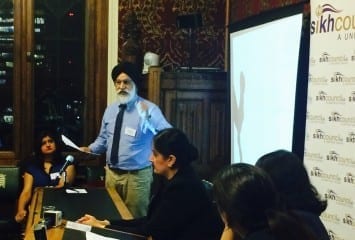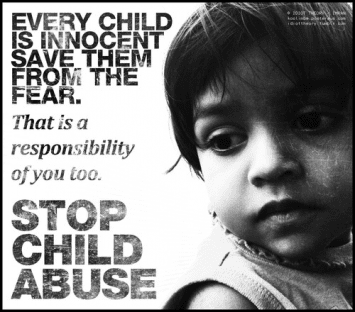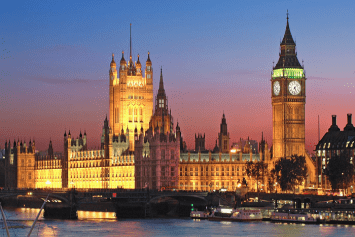There is no honor is silencing victims of abuse: Safeguarding Children and Adults the need to reform Sikh Institutions



It is commonly asserted that the Sikhs are one of the most successful minority communities in the UK; that the community functions according to a strong ethic of honesty, hard work, social service, social justice and universal kindness. Whilst nobody can deny this to be the case, there is also, I would like to suggest a danger in characterizing the Sikhs, or for that matter any community, in such idealistic way.
Like all communities, we Sikhs have our fair share of social and familial problems, but for a variety of reasons, there has been a reluctance, and perhaps even a conspiracy, under the guise of ‘political correctness’, or a fear of ‘washing our dirty linen in the public’, to sweep things under the carpet or to paper over the cracks. Where we are confronted with difficult issues associated with abuse and violence, especially where it is of a sexual nature, be that in the family home or within the community, how often do we hear the words, “gal nahi karni”! ( keep quite ), “beizti ho javeigee” (we need to save our family and/community honor)?
It is precisely this kind of perverse logic that creates a vicious cycle of self-delusion and denial that results in vulnerable children and adults from being protected in community, but especially, our religious institutions. The flawed logic begins with the false premise that sexual abuse is associated with sexual promiscuity. Promiscuous behaviors is seen to by synonymous with the white westerners (‘gorey’) who are deemed to be dirty (‘ganday’). This perception is reinforced by a feeling that rarely are any cases of abuse within the Sikh community reported in the media. This leads to a view that such activity simply does not happen in our communities.


 However, know from research, most adults are not abusers and thankfully, the vast majority of children are not abused, and coupled with the fact that Sikhs are a minority community, there is likely to be little reporting of such cases in the media. Of course, one of the reasons for the lack of media reporting is simply that when it comes to sexual abuse and violence, due to the difficulty of securing prosecutions, the true scale remains hidden.
However, know from research, most adults are not abusers and thankfully, the vast majority of children are not abused, and coupled with the fact that Sikhs are a minority community, there is likely to be little reporting of such cases in the media. Of course, one of the reasons for the lack of media reporting is simply that when it comes to sexual abuse and violence, due to the difficulty of securing prosecutions, the true scale remains hidden.
When such abuse happens, more often than not, the dense community and family networks close ranks in a conspiracy of self-denial and collusion and a perverse feudal logic of damage limitation kicks in. Our so-called community leaders, who tend almost exclusively to be men, act as self-appointed gate keepers. And the child protection agencies, such as the police and social services, as revealed in the Rotherham sexual grooming case, for fear of racism, have historically backed off. The tragedy and injustice is that the victims become silenced, the perpetrators are not stopped and the abuse continues. And the perverse stereotype that ‘sexual abuse and sexual grooming doesn’t happen in our community’, becomes perpetuated.
The cycle of patriarchal collusion and denial of abuse was perhaps most spectacularly played out in the public arena almost 10 years is relation to the play Beizti. The play, written by Gurpreet Kaur Batti, was a semi biographical account of physical and sexual abuse within the Sikh community, including, most controversially, in the confines of the Gurdwara. However, the play sparked controversy resulting in violent protests by Sikhs, at the Birmingham Repertory Theatre, resulting in its cancellation after just 2 days! Amongst the protestors were many ‘respected’ elders who were apparently enraged with scenes in the play depicting sexual abuse, rape and violence involving the priest in the Gurdwara. It was claimed that as the Gurdwara was a place of worship, the Gods house, such behaviors simply could not take place and that the play was an insult to the Sikh faith. Yes, no doubt Sikhi totally condemns all forms of abuse, and that such behavior is rare, but to suggest that abuse doesn’t happen within the Sikh community and Sikh institutions is a very dangerous fallacy, a dangerous lie that can only encourage abusers in the knowledge that they will not be exposed.


 And therefore I am heartened that 10 years on from this shameful episode, the conspiracy of silence has finally been breached by the UK Sikhs themselves. The Sikh community, by establishing a comprehensive strategy for safeguarding children and vulnerable adults is today taking a giant leap forward. The Sikh Council UK is to be congratulated for its courage in confronting the community at all levels forcing us to face reality and for good people to become the eyes and ears of the most vulnerable sections of our community.
And therefore I am heartened that 10 years on from this shameful episode, the conspiracy of silence has finally been breached by the UK Sikhs themselves. The Sikh community, by establishing a comprehensive strategy for safeguarding children and vulnerable adults is today taking a giant leap forward. The Sikh Council UK is to be congratulated for its courage in confronting the community at all levels forcing us to face reality and for good people to become the eyes and ears of the most vulnerable sections of our community.
But most of all, I must really pay homage my sisters, who been working behind the scenes to build the Safer Sikhs Partnership from scratch in such a short period. And slot the very many survivors of abuse that continue to deal with their own pain but heroically, seek to hear and stop the pain of others who often suffer in silence. Where there is a will, where there is vision, there is always a way.
Some member of the community will no doubt respond with suspicion and choose to remain in denial of the real problems. For them, whether or not they are involved in running Gurdwaras and other institutions, please do not repeat the errors of the Catholic Church, which was nearly bankrupted because of its denial of abuse within its various institutions for many years. Survivors of abuse successfully launched civil and in some cases criminal law suites resulting in millions of pounds of damages being paid out. But of course, it would be absurd to suggest that saving money should be the motive for addressing the issue. The issue is a deep moral, religious and political issue that anybody that claims to be a true Sikh can simply not deny.
Our great Gurus established dharamsalas and institutions for sanctity, social service and care and Guru Gobind Singh Ji created the Khalsa to protect the vulnerable and weak. It is our duty therefore to uphold these noble traditions and expose those individuals and groups who seek to exploit their power in abuse vulnerable people. But policies, documents and even legislation on their own cannot deliver safeguarding for vulnerable children and adults in the Sikh community. What we need to do is engage in a massive program of awareness. We will need to continue to educate all sections of our community, to train the 1000’s of sevadars (volunteers) about safeguarding, to get the systems in place to carry out comprehensive checks, but above all, we need to empower the victims and their families, and we need to expose and prosecute the abusers.


 No faith sanctions abuse, but once a belief system or tradition becomes institutionalized, it becomes subject to social, psychological and organisational forces that can lead to unscrupulous individuals in abusing their power over vulnerable people. This is a universal phenomena and the ultimate expression of the Ego that Gurbani warns us of over and over again. The Sikhs tradition was born to confront all kinds of injustice. The gurus stood up against prevailing oppressive practices such as satti, untouchability, child brides, ritual violence, dowry violence and slavery. If we are to claim to be the true guardians of our great faith tradition, then we must uphold the teachings of our gurus and confront the evil of abuse against anybody. Once again, I congratulate the SCUK on this historic launch of the Safer Sikhs Partnership on this historic launch at the mother of all parliaments.
No faith sanctions abuse, but once a belief system or tradition becomes institutionalized, it becomes subject to social, psychological and organisational forces that can lead to unscrupulous individuals in abusing their power over vulnerable people. This is a universal phenomena and the ultimate expression of the Ego that Gurbani warns us of over and over again. The Sikhs tradition was born to confront all kinds of injustice. The gurus stood up against prevailing oppressive practices such as satti, untouchability, child brides, ritual violence, dowry violence and slavery. If we are to claim to be the true guardians of our great faith tradition, then we must uphold the teachings of our gurus and confront the evil of abuse against anybody. Once again, I congratulate the SCUK on this historic launch of the Safer Sikhs Partnership on this historic launch at the mother of all parliaments.




